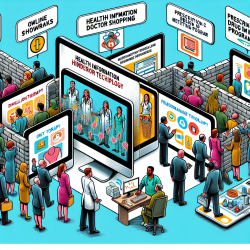The complexity and uncertainty around Persistent Physical Symptoms (PPS) make it challenging to diagnose and treat, especially within the constraints of time-limited consultations and limited practitioner knowledge. However, recent research highlights the importance of enhancing healthcare practitioners' clinical skills to manage PPS effectively. The systematic review and narrative synthesis titled "Clinical skills development for healthcare practitioners working with patients with persistent physical symptoms (PPS) in healthcare settings: a systematic review and narrative synthesis" provides valuable insights into effective training programs that can significantly improve patient outcomes.
Key Findings from the Research
The review analyzed six studies, each focusing on improving healthcare practitioners' communication skills through educational and experiential learning methods. The training programs included:
- Theoretical presentations on PPS conceptualizations, etiology, and epidemiology.
- Skills training through role play and video consultation reviews.
- Blended learning approaches integrating online and face-to-face sessions.
Impact on Healthcare Practitioners
The studies demonstrated that training programs led to increased confidence and self-efficacy among healthcare practitioners. Key improvements included:
- Enhanced ability to explore patients' health beliefs and psychosocial issues.
- Better communication and information-giving skills.
- Development of a more holistic, patient-centered approach to consultations.
Impact on Patients
Patients consulting trained healthcare practitioners reported higher levels of satisfaction and better understanding of their symptoms. Significant improvements were noted in:
- Patient satisfaction and engagement in their own healthcare.
- Reduction in somatic symptom severity and psychosocial distress.
- Improved quality of life, particularly in mental health domains.
Barriers and Recommendations
Despite the positive outcomes, barriers to the uptake of training programs were identified, including negative attitudes towards PPS patients and the lack of structured consultation tools. To address these issues, the following recommendations are made:
- Integrate PPS training into undergraduate and continuous professional development (CPD) programs.
- Focus on developing mind-body explanations and holistic approaches to symptom management.
- Encourage multidisciplinary collaboration to provide comprehensive care.
Conclusion
The review underscores the importance of developing healthcare practitioners' skills to manage PPS effectively. By adopting a holistic, patient-centered approach and enhancing communication skills, practitioners can significantly improve patient outcomes and reduce healthcare costs.To read the original research paper, please follow this link:
Clinical skills development for healthcare practitioners working with patients with persistent physical symptoms (PPS) in healthcare settings: a systematic review and narrative synthesis.










